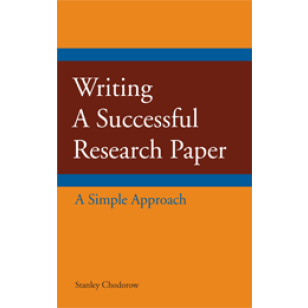Writing a Successful Research Paper: A Simple Approach
"Writing a successful research paper is not easy, but Stanley Chodorow's book is so lucid and well organized that, with it as an aid, students will find the process less daunting—and perhaps even satisfying. The sixth chapter, on using evidence, is the best and most helpful thing I've ever read on that crucial topic."
—Al Filreis, Kelly Professor of English, Faculty Director of the Kelly Writers House, and Director of the Center for Programs in Contemporary Writing, University of Pennsylvania
eBook available for $10.95. Click HERE for more information.
This brief, practical guide offers a clear and comprehensive strategy for conceptualizing, approaching, and executing the task of writing a research paper in the humanities and social sciences. In addition, it provides:
- a critical and process-oriented approach to the tasks of topic selection, formulation of the research question, thesis development, and argumentation.
- judiciously selected examples drawn from a broad range of disciplines.
- concise treatment of the aims, methods, and conventions of scholarly research, including the opportunities and pitfalls of Internet use.
- a wealth of conceptual and organizational tools, and more.
Reviews:
"Writing a successful research paper is not easy, but Stanley Chodorow's book is so lucid and well organized that, with it as an aid, students will find the process less daunting—and perhaps even satisfying. The sixth chapter, on using evidence, is the best and most helpful thing I've ever read on that crucial topic."
—Al Filreis, Kelly Professor of English, Faculty Director of the Kelly Writers House, and Director of the Center for Programs in Contemporary Writing, University of Pennsylvania
“From freshman theme to graduate thesis, the research paper is a complex assignment. This readable and engaging book guides students through the process of producing one, explaining not only how to approach each step along the way but also how sound execution of each step contributes to a successful outcome. Its clear organization allows students either to dip into the book as needed or read it cover to cover.”
—Carolyn Lougee Chappell, Frances and Charles Field Professor in History, Martin Family Fellow in Undergraduate Education, and Director of Structured Liberal Education, Stanford University
"At last!—a short and snappy book on how to approach writing research papers. This volume is a welcome alternative to the thick "how-to" books that stress mechanics. Chodorow helps one think through the process of crafting a research paper. All else follows thereafter."
—Carol DeBoer-Langworthy, Department of English, Brown University
"Clear, concise, and includes helpful, concrete strategies for students writing papers."
—Alison Bruey, Department of History, University of North Florida
"An excellent resource—rigorous, thorough, clear. I will definitely use it in upper-level (as well as intro.) English courses."
—Rachel Hadas, Department of English, Rutgers University
About the Author:
Stanley Chodorow is Professor Emeritus of History, University of California, San Diego. He has won four teaching awards and continues to teach undergraduates.
To view a sample of the text, please click HERE to download a pdf of chapter 1.
Contents:
Introduction: Writing a Research Paper
Synopsis of the Research and Writing Process
Chapter 1. Finding a Research Question and the Resources to Write about It
Getting Started—Choosing a General Topic
Gathering Information on Your Broad, General Topic
Finding Your Narrow, Specific Topic
Evidence and Sources of Evidence
Finding Sources
Evaluating the Credibility of Sources
Chapter 2. Reading and Taking Notes
The Tasks of Reading Critically
The Mechanics of Reading Critically
Note-Taking
Annotating
The Problem with Highlighting
Recording Necessary Bibliographic Information
Recording Your Notes
Chapter 3. Formulating an Open-Ended Research Question
Good Questions
Why an Open-Ended Question That’s Narrow?
Formulating Your Question
Classifying Questions by How, or Whether, They Can Be Answered
Types of Questions and Answers
Keeping Track of Questions, Ideas, and Evidence
Chapter 4. Working toward an Answer to Your Question: Focusing Your Reading, Considering Arguments, and Refining Your Question
Exploring Arguments and Counterarguments
Reflecting on Your Research Question as You Proceed
Chapter 5. Answering your Question and Constructing Your Argument
Sort Notes and Texts
Write a Working Thesis
Types of Arguments
The Organization of Arguments
The Structure of the Paper
The Functional Components of a Paper
Argument Chart
Chapter 6. Using Evidence Properly and Effectively
Directness of Evidence
Search for Direct Evidence First
Determining the Validity of Evidence—and Showing It
Putting Evidence to Work: Weaving a Web of Corroboration
Explanation and Interpretation of Evidence
What Is Sufficient Evidence to Support an Argument?
Chapter 7. Using the Work of Others: Crediting Your Sources
Placing One’s Work in the Context of Earlier Scholarship
Using the Work of Others
Citations and the Authority of Your Sources
Giving Credit Is Essential to the Enterprise
Strategies for Avoiding Misuse of Sources
Chapter 8. Shaping the Paper: Writing a Prospectus and a Rough Draft
The Value and Character of a Prospectus
Writing a Rough Draft
Using a Rough Draft Worksheet
The Rough Draft/Prospectus Worksheet
Chapter 9. Revising the Rough Draft
The Goals of Revising a Rough Draft
Organizing the Paper
Chapter 10. Copyediting and Final Revision
Final Revision
Final Suggestions
Final Revision Checklist
Conclusion
Index





